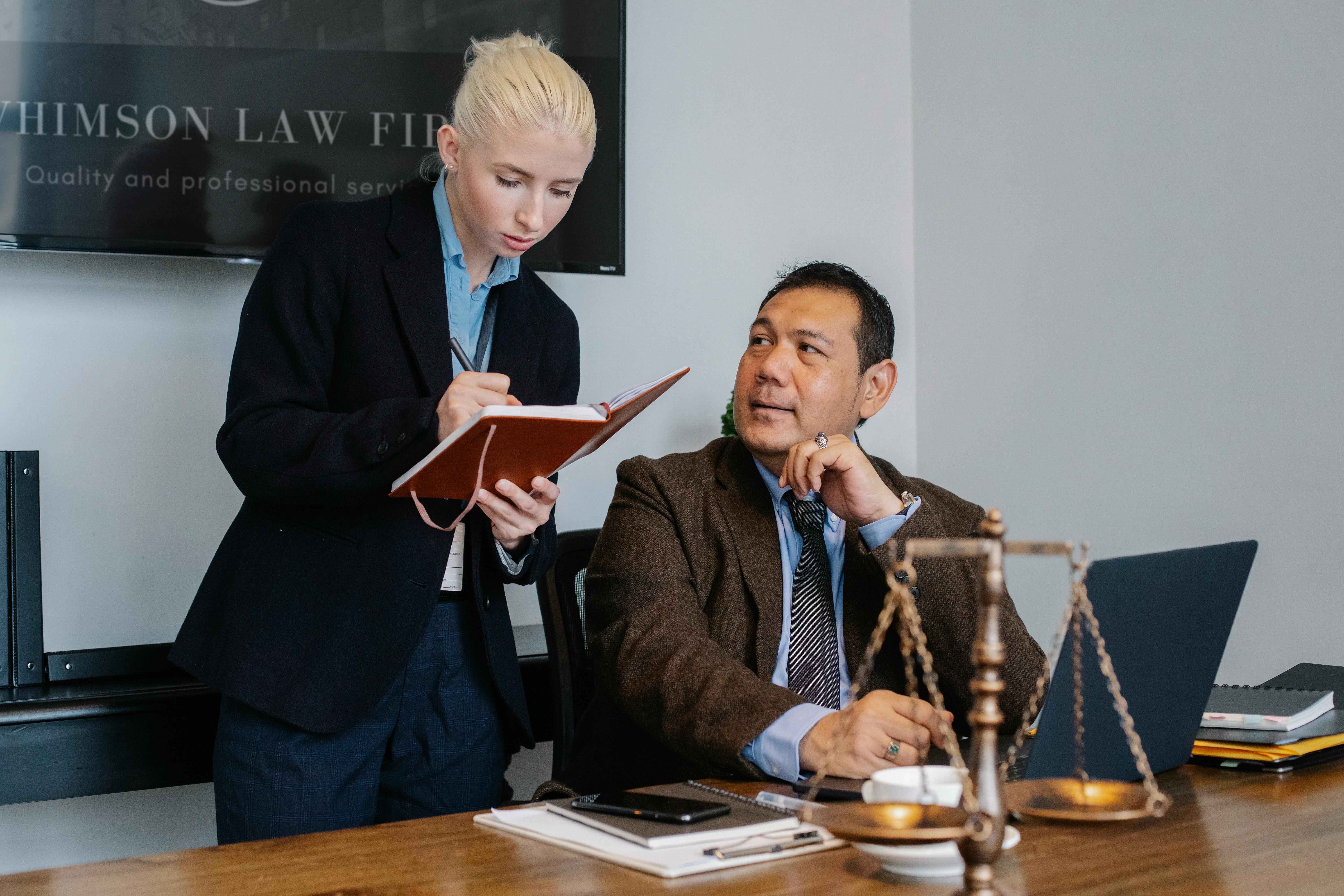
Efficient and Transparent Process
We guide you through every step of the process, ensuring you are informed and supported at all times.
Legal Excellence as the Cornerstone of Our Continuous Improvement
We continuously adapt to changes in the legal and business environment to remain at the forefront of the industry. We implement the most advanced management standards, always in strict compliance with the applicable legal framework. In this way, we guarantee our clients a service defined by the highest levels of safety, efficiency, and reliability.

When you hire a stockbroker, you place your trust in a trained financial professional with in-depth knowledge of how the stock market works and the responsibility to manage your investments with diligence and care.
However, even the most experienced brokers can make mistakes or engage in negligent conduct, which can result in significant losses for investors — including those with extensive market experience.
Substantial losses in stock market investments not only affect your assets but can also have a significant impact on your emotional well-being and financial peace of mind.
If you have recently suffered losses in the stock market, it is essential to understand your rights and the legal avenues available to seek fair compensation. Our team of attorneys specializing in securities law is ready to advise and represent you in recovering your investments, analyzing each case with rigor and professionalism to protect your interests.
Securities Fraud Attorneys

A securities fraud attorney represents investors who have suffered financial losses due to unlawful or negligent conduct by stockbrokers, such as unauthorized trades, false statements, material omissions, or improper commission charges.
Our legal team assists clients in recovering damages through arbitration proceedings, civil lawsuits, or claims before regulatory bodies against brokers and investment firms engaged in fraudulent practices.
At ALESSANDRO R. FERRARO ASSOCIATED, our law firm brings decades of experience in litigation related to stockbroker fraud, providing effective counsel and representation to numerous affected investors. We conduct a thorough analysis of each case to determine the best legal strategy for maximizing the recovery of your financial losses.
Investors trust their brokers to manage their financial resources professionally and diligently. For this reason, brokers and securities investment platforms have a fiduciary duty to act competently, transparently, and in their clients’ best interests. When that trust is breached through irregular or fraudulent conduct, investors have legal mechanisms to demand accountability and seek compensation.
Backed by Investor-Protective Legal Framework
Securities Act of 1933:
Regulates the public offering and sale of securities, requires financial disclosure, and prohibits fraud and misrepresentation in the sale of securities.
Securities Exchange Act of 1934:
Establishes the SEC and regulates secondary market trading, including the oversight of exchanges and brokers.
Investment Company Act of 1940:
Regulates investment funds and investment advisers to protect investors.
Blue
Sky Law:
They are state laws that regulate the offering and sale of securities within each state, requiring registration and protecting against local fraud.
Federal Criminal Code 18 USC § 1348:
Defines securities fraud as a federal crime, including market manipulation and insider trading.
Specialized attorneys use these laws to file claims, lawsuits, or arbitration proceedings to recover losses caused by misconduct, fraud, or violations of regulations by brokers or investment firms.
Our firm has a team of highly skilled professionals providing legal advice and representation across a wide range of practice areas. While our primary focus is on commercial law, we offer comprehensive services covering multiple legal fields, ensuring specialized and effective attention for every case.
- Specialized legal advisory and consulting services for individuals and businesses, with a detailed analysis of legal risks and opportunities.
- Review, drafting, and negotiation of contracts and legal documents, ensuring regulatory compliance and the protection of our clients’ interests.
- Legal representation in judicial and administrative proceedings, including civil, commercial, arbitration, and regulatory litigation.
- Mediation and arbitration as alternative dispute resolution mechanisms, focused on efficient and mutually agreed solutions.

WHAT IS THE PROCESS OF A COMMERCIAL LAWSUIT?
When a dispute arises between parties—whether individuals or legal entities—it’s common for each side to have its own view of the facts. However, these perceptions can be influenced by emotions and may not necessarily align with the applicable legal framework.
For this reason, it is essential not to act without specialized legal counsel. Proceeding without professional guidance may lead to taking improper measures, inadvertently committing unlawful acts, and ultimately losing your case.
Hiring a team of attorneys with experience in commercial litigation is the soundest decision to protect your rights and interests. Although not all lawyers have the necessary specialization in commercial law, our firm has the expertise and track record to handle these matters effectively.
We follow a rigorous and thorough process designed to avoid oversights and maximize favorable outcomes for you as our client. Below is a detailed explanation of the process we carry out in commercial litigation.

1. FILING THE LAWSUIT
The judicial process begins with the formal filing of the complaint by the plaintiff. This document clearly and precisely sets out the facts supporting the claim, establishes the competent jurisdiction, and specifies the type of remedy or compensation sought—usually monetary. It is essential for the plaintiff to provide sufficient evidence to support the truthfulness of the alleged facts; otherwise, the defendant may file a motion to dismiss, which could bring the case to an end without any liability for their client.

2. ANSWER TO THE COMPLAINT
Once the complaint is admitted, the defendant must file an answer within the legal deadline. In this document, the defendant must admit or deny each of the facts stated in the complaint. If denying any fact, it is essential to present a well-founded defense supported by evidence that can be proven during the trial. At this stage, the defendant may also file a counterclaim, asserting their own claims arising from the same legal relationship, which must be done in a timely manner to avoid later procedural complications.

3. DISCOVERY AND EVIDENCE PRODUCTION STAGE
The discovery period is a crucial phase of the process in which both parties are entitled to request, exchange, and examine all information and documentation relevant to the case, always under the principles of relevance and proportionality. This includes formal requests for admissions, production of documents, written interrogatories, and sworn oral depositions. Although this stage often entails significant costs in terms of time and human resources, it is essential for strengthening each party’s position in the proceedings and, in many cases, fosters negotiation and the conclusion of out-of-court settlements.

4. SUMMARY JUDGMENT OR PRE-TRIAL RESOLUTION
Once the evidentiary stage is complete, it is common for one of the parties to request an early resolution of the dispute through a motion for summary judgment. This request is appropriate when there are no significant disputes over material facts and the applicable law is clear, allowing the judge to issue a ruling without the need for a trial. However, granting this motion is the exception rather than the rule, as most cases involve factual disputes requiring deeper analysis. If the motion is denied, the case proceeds to trial, where the substantive controversy will be resolved.

5. RECOVERY OF PAST-DUE ACCOUNTS
In the commercial sphere, it is common for companies to face delays or defaults in the payment of debts arising from the sale of goods or the provision of services. This situation negatively impacts cash flow and business profitability. The recovery of past-due accounts is a specialized activity that requires not only effective collection strategies but also proper legal support. In many cases, payment agreements are backed by legal instruments that empower the company to demand the compulsory fulfillment of obligations. Our firm has extensive experience in the management and recovery of delinquent accounts, through persuasive negotiations or, when necessary, the initiation of legal proceedings to ensure debt satisfaction.

Preliminary Assessment for Debt Recovery
The first step in the debt recovery process is to conduct a thorough feasibility analysis. Our legal team carefully evaluates the guarantees provided, the amounts owed, and the age of the debt in order to determine the likelihood of effective recovery. This stage is essential for defining the most appropriate strategy and avoiding futile efforts.

Progressive Collection Strategies
Once the assessment phase is complete, we implement tiered collection strategies, starting with amicable methods and progressing to more formal actions. Initially, communications are carried out via phone calls, emails, text messages, and written correspondence. Subsequently, direct in-person collection efforts may take place, always considering the specific circumstances and associated risks, as in some cases the debtor may show resistance or hostile behavior.
When out-of-court efforts prove unsuccessful, we turn to legal action, initiating the appropriate proceedings to secure debt satisfaction while safeguarding our client’s interests at all times.

6. PROCEEDINGS IN FINANCIAL JURISDICTION
Proceedings within the financial jurisdiction require specialized, professional handling. Regardless of a party’s procedural posture (plaintiff or defendant), specialized legal counsel is essential to ensure proper defense or representation.
Generally speaking, a proceeding in the financial jurisdiction is one in which a dispute involving financial rights is submitted for judicial consideration, seeking a ruling on whether the claim is warranted.
It should be noted that there are various procedural modalities within this jurisdiction, each with its own phases and specific requirements, which will be analyzed in detail to address any questions.
DECLARATORY PROCEEDING IN FINANCIAL MATTERS
The purpose of a declaratory proceeding is to obtain a ruling from the court that recognizes and upholds the claim presented. This procedure is characterized by specific phases, including the filing of the complaint, the answer, the evidentiary stage, hearings, and judgment, among others.
Proper management of this process is essential to ensure the protection of the client’s rights and the effectiveness of the court’s ruling.

Pleadings Stage
In this initial stage of the proceeding, the parties formally present the relevant facts and set out their claims before the court. The complaint is the principal act in this phase, where the subject matter of the dispute must be specified, accompanied by the legal grounds supporting the claim and the proposed evidence to prove those facts. Each party is required to present its pleadings clearly and precisely, ensuring that the claim and the facts are properly connected and supported by evidence.
In the context of financial jurisdiction, given its civil nature, the complaint simultaneously represents the exercise of the right of action and the formulation of the claim, marking the starting point of the proceeding.

Evidentiary Stage
The purpose of this stage is for both parties to prove to the court the truth of the facts and legal grounds presented during the pleadings stage. The plaintiff must demonstrate the existence of the facts supporting their claim, while the defendant bears the burden of proving any exceptions or defenses.
Both parties have equal procedural rights to present documentary, testimonial, expert, or any other evidence permitted by law. The judge may actively participate by posing questions to the parties or witnesses to clarify the facts. This stage is crucial for closing evidentiary gaps and strengthening the court’s conviction, thereby facilitating a fair and well-founded resolution.

Closing Arguments Stage
Once the presentation and evaluation of evidence are complete, the parties present their closing arguments, which consist of the final exposition of their reasoning based solely on the facts and evidence admitted during the proceeding. No new facts may be introduced, nor may existing ones be modified, to prevent contradictions or inconsistencies that could affect the validity of the process.
After the closing arguments, the court issues its judgment, bringing the dispute under its consideration to a conclusion.

Appeals and Remedies
After the judgment is issued, the affected party retains the right to file the appropriate remedies, such as an appeal or a petition for cassation, in accordance with applicable law. These remedies aim to review the judicial decision to correct potential errors of fact or law.
However, the right to appeal is not absolute and is subject to legal requirements and judicial discretion. In some cases, the court may limit or deny the admission of remedies, depending on the nature of the matter and the ruling issued.

Judicial Enforcement Process
The enforcement process is the phase in which the orders contained in the judgment are carried out, especially when the condemned party does not voluntarily fulfill their obligations. At this stage, the court plays the primary role, with the authority to take the necessary actions to enforce the judicial ruling.
In the context of private and administrative law, the court holds the exclusive responsibility to initiate and oversee the compulsory compliance with the judgment, thereby ensuring the effective protection of the recognized right.

Precautionary or Interim Measures Procedure
During the declaratory proceeding, the plaintiff may request precautionary measures to protect their rights and prevent the defendant from obstructing or unduly delaying the process.
The precautionary process, also known as injunctive relief, allows the judge or competent authority to issue interim measures aimed at ensuring the effectiveness of the eventual judgment, preventing acts of sabotage or the improper disposition of assets or rights related to the litigation.
Comprehensive Legal Advisory in Investment Processes
In the business and asset management realm, financial decisions are a critical factor that can determine the success or failure of any project, investment, or real estate acquisition. The mobilization of significant economic resources requires rigorous analysis and specialized legal support to avoid adverse consequences resulting from errors, regulatory noncompliance, or poorly informed decisions.
Inadequate management can lead to substantial financial losses, affect assets, and even expose parties to legal contingencies. Therefore, it is essential to identify and work with solid financial institutions that provide appropriate legal and financial backing.
It is also crucial to evaluate and manage complex credit situations, such as liens, mortgages, and pressures from collection agencies, which can compromise both personal and business financial stability. In many cases, seeking investment alternatives to cover debts may lead to fraudulent or illegal schemes, increasing risk and uncertainty.
Our firm has a multidisciplinary team of attorneys specializing in financial and commercial law, trained to address these issues with objectivity and technical rigor, providing strategic advice and comprehensive support throughout the entire process.
Below, we present some of the specific areas in which we offer our expertise. For any other legal needs, we are available for a personalized consultation.


1. Claims Arising from Consumer and Business Bankruptcies
Bankruptcy proceedings are complex legal matters that require expert guidance for effective management. Our attorneys have decades of experience in protecting personal and corporate assets during bankruptcy proceedings. We provide comprehensive guidance on your rights and work diligently to enforce them, ensuring the best possible outcome in these challenging situations.

2. Banking Matters and Financial Disputes
Navigating the complexities of loans, mortgages, banking documentation, and related disputes can be overwhelming. Our legal team provides specialized assistance to interpret and manage these transactions, guiding you at every stage to protect your interests and ensure compliance with applicable regulations.

3. Debt Resolution and Negotiation
Debt is an inherent part of business operations, but prolonged or mismanaged obligations can jeopardize financial stability. Our attorneys specialize in negotiating fair and sustainable debt restructuring agreements, providing clients with the time and flexibility needed to secure capital and maintain operational continuity.

4. Tax Law and Fiscal Compliance
Tax law is notoriously complex and constantly evolving, often compared to learning a foreign language. Our tax law specialists help you understand the legal framework affecting your personal and business finances, ensuring regulatory compliance while minimizing tax burdens. We provide strategic guidance at every stage of the tax process, protecting you from costly violations and audits.

5. Annuities, Insurance, and Estate Planning
Our firm has experienced attorneys in insurance and annuities law who help clients understand the implications of these contracts for their financial and business planning. Additionally, we provide expert guidance on estate planning instruments such as trusts and wills. Given the dynamic nature of estate laws, we ensure that your documents are up-to-date and enforceable, safeguarding your legacy exactly as you intend.
